Guest Blogged by John Gideon
 Tonight we had two segments on voting issues. The first on the lawsuit in Ohio against Ken Blackwell, will help to ensure the 2004 voting records are saved for longer than may be the whim of Blackwell. The suit also asks that Blackwell be removed from the ability to oversee his own election for governor. Also HR-550 is discussed by Congressman Rush Holt and a representative of Election Science Institute.
Tonight we had two segments on voting issues. The first on the lawsuit in Ohio against Ken Blackwell, will help to ensure the 2004 voting records are saved for longer than may be the whim of Blackwell. The suit also asks that Blackwell be removed from the ability to oversee his own election for governor. Also HR-550 is discussed by Congressman Rush Holt and a representative of Election Science Institute.
Note: While they reported that the bill has 159 co-sponsors the number is actually 211 or 209 when you discount one co-sponsor who is now a Senator and the District of Columbia delegate who has no real vote.
The text-transcript of tonight's segment on Lou Dobbs Tonight follows in full...
Christine Romans reports.
ROMANS (voice-over): Those now-famous paper ballots from the 2004 presidential election will be preserved a little longer. Ohio Secretary of State Ken Blackwell instructing county election boards to hold onto those ballots.
Ohio election rights activists demanding as much in a federal lawsuit filed this week. They continue to question the outcome of the 2004 presidential election and say they are still uncovering irregularities in the ballots.
CLIFF ARNEBACK, VOTING RIGHTS ATTORNEY: Because there have been so many issues raised and we are finding evidence of tampering, both sides in this court proceeding need to have the opportunity to look at the real evidence.
ROMANS: Federal law requires ballots from a presidential election be saved for 22 months, and these could have been destroyed starting next week.
The press secretary for Ohio's secretary of state said, "To the extent that the conspiracy theorists out there are wanting to continue to suggest that there was some sort of coordinated or concentrated effort to have an unfair election in Ohio, it doesn't match up with the facts."
ROMANS: But this sweeping federal lawsuit filed by voter rights advocates disagrees. They want a judge to appoint someone other than Blackwell to oversee this November's election since he himself is running for governor --- Kitty.
PILGRIM: Thanks very much.
Christine Romans.
Well, we have covered the threat that electronic voting poses to our democracy extensively in this broadcast. With the November elections just a few months away, activists are pushing for reliable and auditable elections. And now proposed legislation is calling for federal standards on all electronic voting machines.
PILGRIM (voice-over): Regulations for electronic voting are a mess. Each state has its own rules, and there are no nationally mandated standards. Congressman Rush Holt is sponsoring a bill to change that.
REP. RUSH HOLT (D), NEW JERSEY: In this day and age on federal elections, with our mobile society, with people moving from place to place, I think it's not at all inappropriate that there be federal standards. You know, under the Constitution, the states will administer the elections. That's the way it works, but the standards can easily be established across the states that will allow for reliability, accessibility, and auditability.
PILGRIM: H.R. 550 calls for a voter-verified paper trail for every vote, $150 million in federal funding to pay for it, audits for two percent of precincts, no wireless or Internet connections for voting machines, with full implementation of the new rules this year in 2006. But many election watchdog groups say the mere introduction of the new machines into this fall's election is problematic.
TRACY WARREN, ELECTION SCIENCE INSTITUTE: You want to be able to implement these new systems in smaller elections, and I know some jurisdictions are going to be having the first run of these new systems in a general election, which is a very perilous enterprise. I think you're going to see a lot of meltdowns.
PILGRIM: H.R. 550 has bipartisan support, 159 co-sponsors. Activists held a lobby day for the bill earlier this summer, organized by Common Cause, verifiedvoting.org, and VoteTrustUSA.
PILGRIM: The main concern about Congressman Holt's bill is the November mid-term election deadline. However, nearly everyone involved believes federal standards for electronic voting should be implemented as soon as possible.


 Sunday 'Close Enough' Toons
Sunday 'Close Enough' Toons A Pretty Weak 'Strongman': 'BradCast' 10/30/25
A Pretty Weak 'Strongman': 'BradCast' 10/30/25 'Green News Report' 10/30/25
'Green News Report' 10/30/25
 Proposal for 'First Politically Viable Wealth Tax' Takes Shape in CA: 'BradCast' 10/29/25
Proposal for 'First Politically Viable Wealth Tax' Takes Shape in CA: 'BradCast' 10/29/25 Monster Storm, Endless Wars, Gamed Elections:
Monster Storm, Endless Wars, Gamed Elections: 'Green News Report' 10/28/25
'Green News Report' 10/28/25 Let's Play 'Who Wants
Let's Play 'Who Wants Sunday 'Cartoonists Dilemma' Toons
Sunday 'Cartoonists Dilemma' Toons Exiled NOAA Scientists Resurrect Critical Disaster Database: 'BradCast' 10/23/25
Exiled NOAA Scientists Resurrect Critical Disaster Database: 'BradCast' 10/23/25  'Green News Report' 10/23/25
'Green News Report' 10/23/25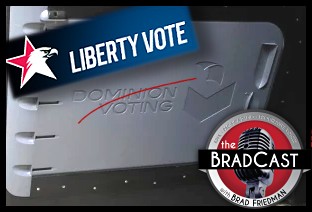 Trump-Allied GOP Partisan Buys Dominion Voting Systems: 'BradCast' 10/22/25
Trump-Allied GOP Partisan Buys Dominion Voting Systems: 'BradCast' 10/22/25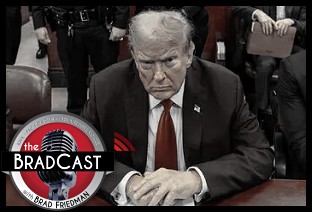 Trump, Republican Law(lessness) & (Dis)Order: 'BradCast' 10/21/25
Trump, Republican Law(lessness) & (Dis)Order: 'BradCast' 10/21/25 'Green News Report' 10/21/25
'Green News Report' 10/21/25 Celebrating 'No Kings': 'BradCast' 10/20/25
Celebrating 'No Kings': 'BradCast' 10/20/25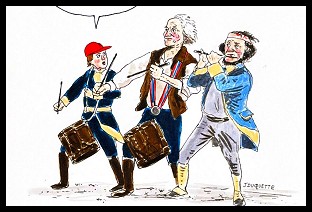 Sunday 'How It Started' Toons
Sunday 'How It Started' Toons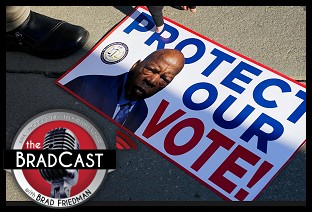 SCOTUS Repubs Appear Ready to Gut Rest of Voting Rights Act: 'BradCast' 10/16/25
SCOTUS Repubs Appear Ready to Gut Rest of Voting Rights Act: 'BradCast' 10/16/25 'Green News Report' 10/16/25
'Green News Report' 10/16/25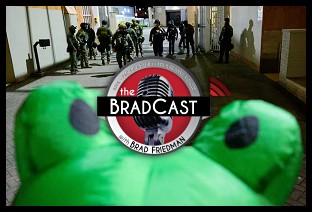 The 'Epstein Shutdown' and Other Autocratic Nightmares: 'BradCast' 10/15/25
The 'Epstein Shutdown' and Other Autocratic Nightmares: 'BradCast' 10/15/25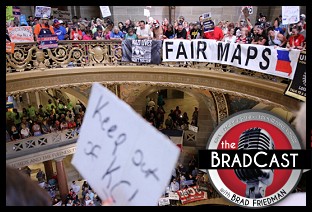 Group Vows to Block MO's GOP U.S. House Gerrymander: 'BradCast' 10/14/25
Group Vows to Block MO's GOP U.S. House Gerrymander: 'BradCast' 10/14/25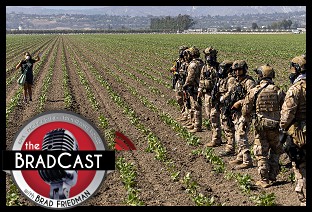 Trump Labor Dept. Warns Trump Policies Sparking Food Crisis: 'BradCast' 10/9/25
Trump Labor Dept. Warns Trump Policies Sparking Food Crisis: 'BradCast' 10/9/25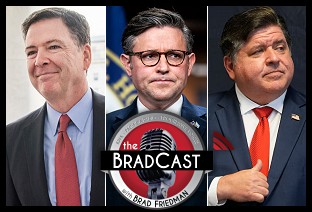 Trump's Losing Battles: 'BradCast' 10/8/25
Trump's Losing Battles: 'BradCast' 10/8/25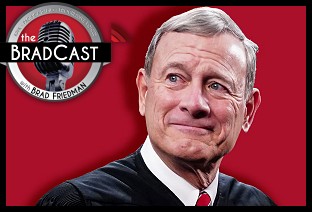 Trump, Roberts and His Stacked, Packed and Captured SCOTUS: 'BradCast' 10/7/25
Trump, Roberts and His Stacked, Packed and Captured SCOTUS: 'BradCast' 10/7/25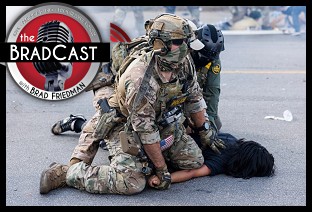 Trump Attempting His 'Invasion from Within': 'BradCast' 10/6/25
Trump Attempting His 'Invasion from Within': 'BradCast' 10/6/25 Biden Budget Expert: Mass Firings in Shutdown 'Illegal': 'BradCast' 10/2/25
Biden Budget Expert: Mass Firings in Shutdown 'Illegal': 'BradCast' 10/2/25 Why is DOJ Suing 'Blue' States for Their Voter Databases?: 'BradCast' 10/1/25
Why is DOJ Suing 'Blue' States for Their Voter Databases?: 'BradCast' 10/1/25
 VA GOP VOTER REG FRAUDSTER OFF HOOK
VA GOP VOTER REG FRAUDSTER OFF HOOK Criminal GOP Voter Registration Fraud Probe Expanding in VA
Criminal GOP Voter Registration Fraud Probe Expanding in VA DOJ PROBE SOUGHT AFTER VA ARREST
DOJ PROBE SOUGHT AFTER VA ARREST Arrest in VA: GOP Voter Reg Scandal Widens
Arrest in VA: GOP Voter Reg Scandal Widens ALL TOGETHER: ROVE, SPROUL, KOCHS, RNC
ALL TOGETHER: ROVE, SPROUL, KOCHS, RNC LATimes: RNC's 'Fired' Sproul Working for Repubs in 'as Many as 30 States'
LATimes: RNC's 'Fired' Sproul Working for Repubs in 'as Many as 30 States' 'Fired' Sproul Group 'Cloned', Still Working for Republicans in At Least 10 States
'Fired' Sproul Group 'Cloned', Still Working for Republicans in At Least 10 States FINALLY: FOX ON GOP REG FRAUD SCANDAL
FINALLY: FOX ON GOP REG FRAUD SCANDAL COLORADO FOLLOWS FLORIDA WITH GOP CRIMINAL INVESTIGATION
COLORADO FOLLOWS FLORIDA WITH GOP CRIMINAL INVESTIGATION CRIMINAL PROBE LAUNCHED INTO GOP VOTER REGISTRATION FRAUD SCANDAL IN FL
CRIMINAL PROBE LAUNCHED INTO GOP VOTER REGISTRATION FRAUD SCANDAL IN FL Brad Breaks PA Photo ID & GOP Registration Fraud Scandal News on Hartmann TV
Brad Breaks PA Photo ID & GOP Registration Fraud Scandal News on Hartmann TV  CAUGHT ON TAPE: COORDINATED NATIONWIDE GOP VOTER REG SCAM
CAUGHT ON TAPE: COORDINATED NATIONWIDE GOP VOTER REG SCAM CRIMINAL ELECTION FRAUD COMPLAINT FILED AGAINST GOP 'FRAUD' FIRM
CRIMINAL ELECTION FRAUD COMPLAINT FILED AGAINST GOP 'FRAUD' FIRM RICK SCOTT GETS ROLLED IN GOP REGISTRATION FRAUD SCANDAL
RICK SCOTT GETS ROLLED IN GOP REGISTRATION FRAUD SCANDAL VIDEO: Brad Breaks GOP Reg Fraud Scandal on Hartmann TV
VIDEO: Brad Breaks GOP Reg Fraud Scandal on Hartmann TV RNC FIRES NATIONAL VOTER REGISTRATION FIRM FOR FRAUD
RNC FIRES NATIONAL VOTER REGISTRATION FIRM FOR FRAUD EXCLUSIVE: Intvw w/ FL Official Who First Discovered GOP Reg Fraud
EXCLUSIVE: Intvw w/ FL Official Who First Discovered GOP Reg Fraud GOP REGISTRATION FRAUD FOUND IN FL
GOP REGISTRATION FRAUD FOUND IN FL

































